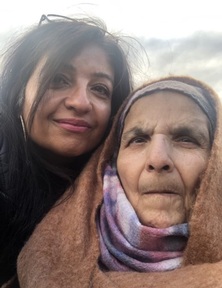Mum's dementia left me desperate to find Punjabi-speaking carers, says daughter
Losing your ability to understand a language is a common issue for people with dementia and it has left one woman fighting for culturally-appropriate care for her mother.

“Managing Mum’s care has been challenging enough over the years but the coronavirus pandemic has made it excruciating”, writes Jag, in a blog for the charity Alzheimer’s Society.
Jag’s mother was diagnosed with Alzheimer’s disease and vascular dementia four years ago and needs 24-hour care. She cannot eat on her own or drink or manage her personal care and has been bedridden for almost a year.
During the national COVID-19 lockdown, Jag says: “Her main carer of three years wouldn’t visit because she was worried and confused and didn’t understand she was exempt from the lockdown. I live 200 miles away, but my sister and I had to step up our visits to look after her three or four times a week.”
‘Lost in translation’
When her mother got chest sepsis during lockdown and had to be hospitalised, Jay says of her mother: “She was traumatised and it was a distressing ordeal for me.
“It was evident that information was being lost in translation between professionals. It was awful not being with her and advocating for her.
“As her dementia has progressed, she has reverted to her native language, Punjabi. The council were unable to help me source Punjabi-speaking carers, meaning her care was not culturally appropriate.
“I’ve had to find Punjabi-speaking carers myself and provide my own Punjabi language resources. I’ve struggled at every juncture”.
Carers UK estimate that an additional 4.5 million people have become informal carers since the COVID-19 pandemic began - taking the total to 13.5 million. There are approximately 850,000 people being supported by formal home care according to the UKHCA.
Jag is now calling for better support for people from Black, Asian and other Minority Ethnic (BAME) communities.
“I had to give up work four years ago as advocating for mum, chasing and challenging the authorities, and managing the carers is a full-time job.
“The council couldn’t help me. They couldn’t help me source any Punjabi-speaking carers. I was desperate. All I ever get from professionals is, ‘Put your mum in a home,’ but that can’t meet her religious, linguistic or other cultural needs.”
'Cracks in the system'
It is common for people with dementia to revert to their mother tongue as dementia progresses. Whether their mother tongue be Welsh, Urdu or Polish, the Alzheimer’s Society says ‘even someone who has spoken a second language for years might start to drop in words from their mother tongue, perhaps unknowingly.
'Over time, the language that’s less familiar and not so deeply embedded tends to be lost first. This is often the language that's been learned later on.
‘The impact of losing the ability to communicate in the language that most people around you speak can be severe.’
Shuhala Abbas, a dementia support worker in east London who works for the charity says: “The majority of families I work with in Redbridge are from the Bangladeshi community. They face specific challenges in getting dementia support, because of cultural issues and deprivation.
“Despite all of this, I feel now is a time we can make huge changes in how BAME communities are supported. More people are noticing and willing to work on the cracks in the system.”
Jag adds: “Government didn’t put any measures in place to educate these [BAME] communities about coronavirus.
“The government mustn’t overlook the under-served communities and they must do more to support unpaid carers like myself. I should be making memories with Mum in these final stages of her life but instead I’m still struggling for support.”
Latest News
 29-Jul-24
Dementia Bus gives carehome.co.uk staff insight into life with dementia
29-Jul-24
Dementia Bus gives carehome.co.uk staff insight into life with dementia
 27-Jul-23
UK's top home care agencies in 2023 revealed
27-Jul-23
UK's top home care agencies in 2023 revealed
 30-Nov-22
A quarter of older people keep their falls secret from family
30-Nov-22
A quarter of older people keep their falls secret from family
 29-Nov-22
'Covid-19 has not gone away' say terminally ill
29-Nov-22
'Covid-19 has not gone away' say terminally ill
 28-Nov-22
IT consultant who received poor care opens 'compassionate' home care business
28-Nov-22
IT consultant who received poor care opens 'compassionate' home care business